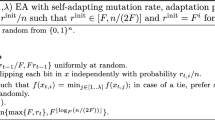Summary
An algorithm is given for on-the-fly garbage collection in the presence of several mutators. It uses two colours and is a generalization of Ben-Ari's algorithm (1984). The correctness proof is based on the lexical orderings of several tuples of state space functions. It is shown that in a certain sense the algorithm is optimal. Three variations of the algorithm are given and proved correct. In the case that there is only one mutator one of these variations closely resembles a well-known incorrect algorithm.
Similar content being viewed by others
References
Ben-Ari M: Algorithms for on-the-fly garbage collection. ACM Toplas 6:333–344 (1984)
Dijkstra EW, Lamport L, Martin AJ, Scholten CS, Steffens EFM: On-the-fly garbage collection: An exercise in cooperation. Commun ACM 21:966–975 (1978)
Dijkstra EW: A personal summary of the Gries-Owicki theory. EWD554. In: Dijkstra EW, Selected writings on computing: a personal perspective. Springer, Berlin Heidelberg New York 1982, pp 188–199
Pixley C: An incremental garbage collection algorithm for multimutator systems. Distrib Comput 3:41–50 (1988)
Owicki S, Gries D: An axiomatic proof technique for parallel programs — Part I. Acta Inf 6:319–340 (1976)
van de Snepscheut JLA: Algorithms for on-the-fly garbage collection revisited. Inf Process Lett 24:211–216 (1987)
Author information
Authors and Affiliations
Additional information
Jan E. Jonker was born in 1943. He received his Master's degree in Theoretical Physics in 1968 and his Master's degree in Computing Science in 1989, both from the University of Groningen. From 1968 until 1976 he did research on the electronic structure of dilute impurities in iron. From 1976 until 1989 he did research on the medical aspects of road accidents. Currently, he is assistant professor at the University of Groningen. His main research interests are programming methodology, parallel computations and delay-insensitive circuit design.
Rights and permissions
About this article
Cite this article
Jonker, J.E. On-the-fly garbage collection for several mutators. Distrib Comput 5, 187–199 (1992). https://doi.org/10.1007/BF02277666
Received:
Accepted:
Issue Date:
DOI: https://doi.org/10.1007/BF02277666




